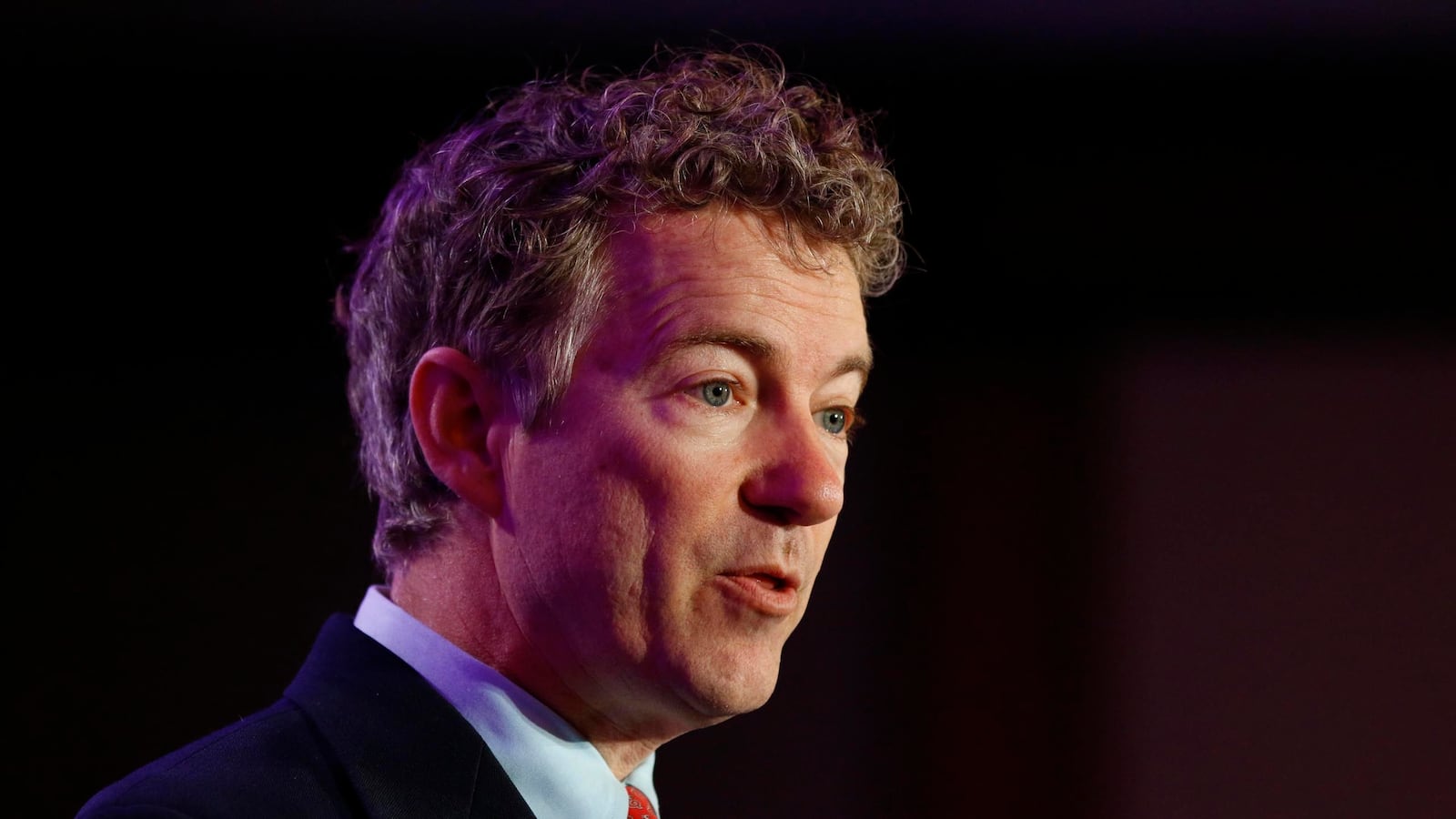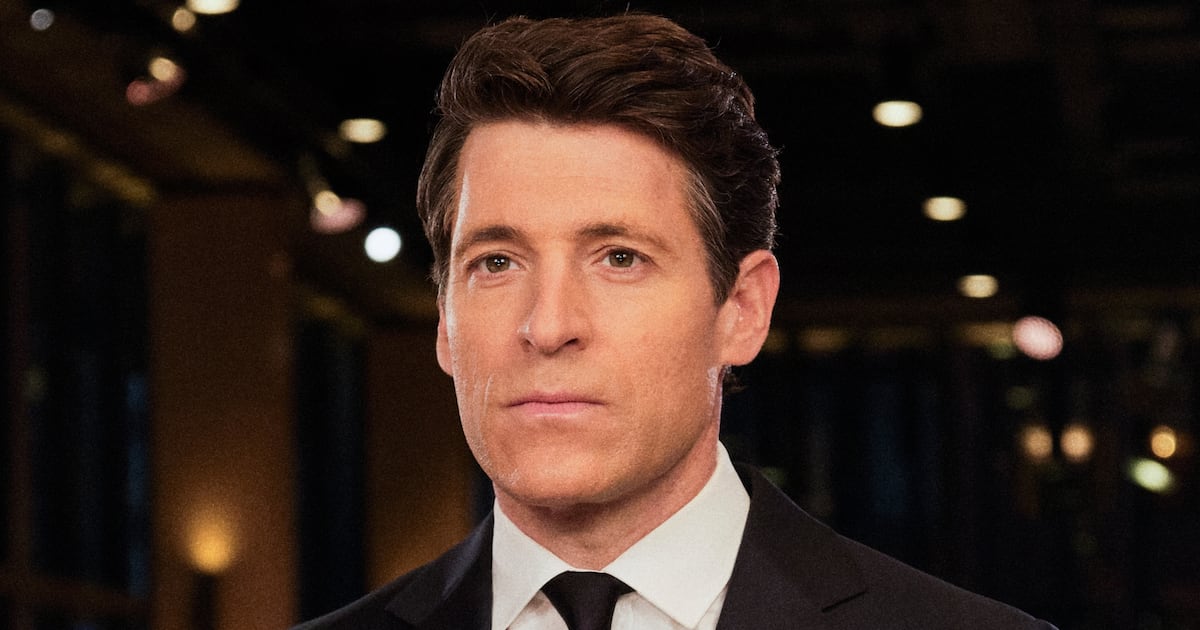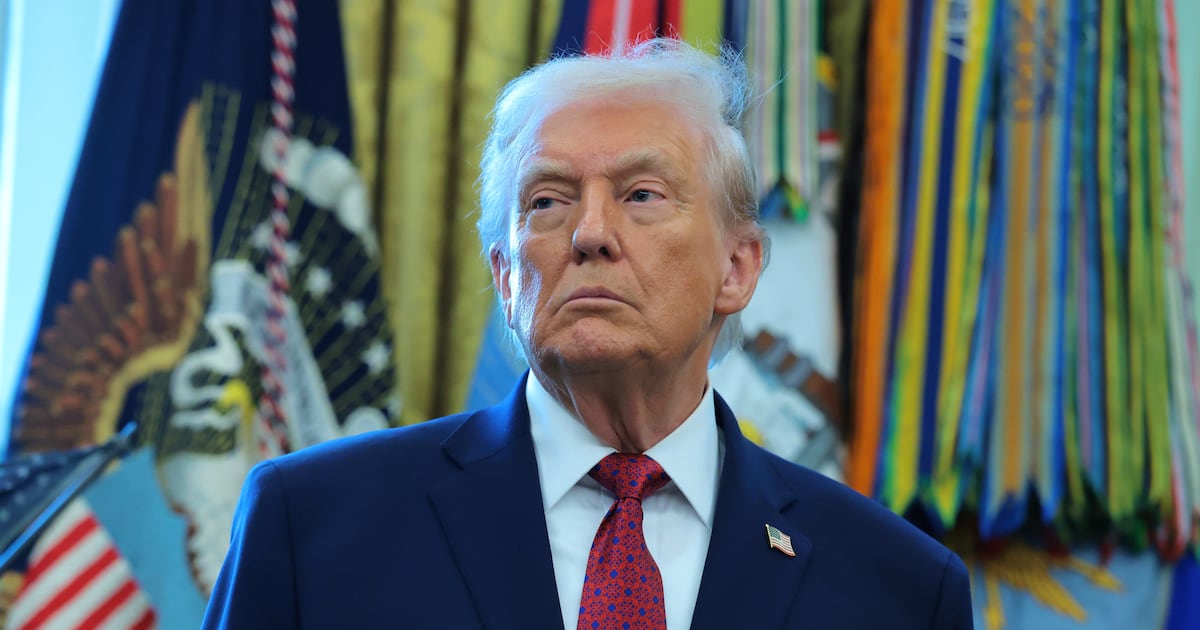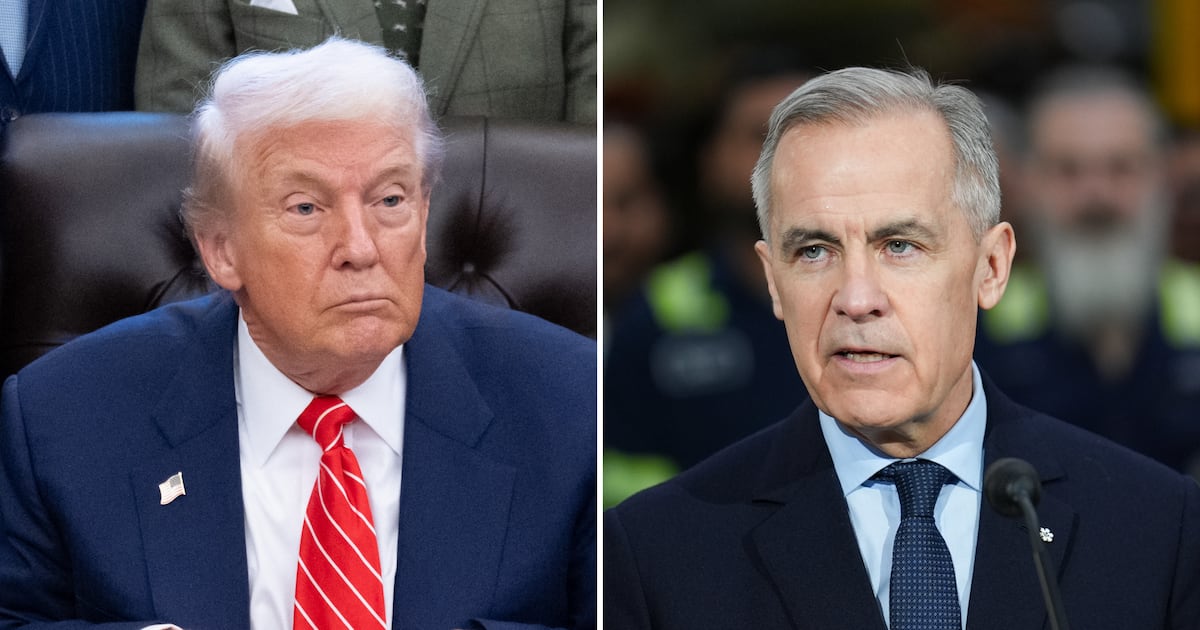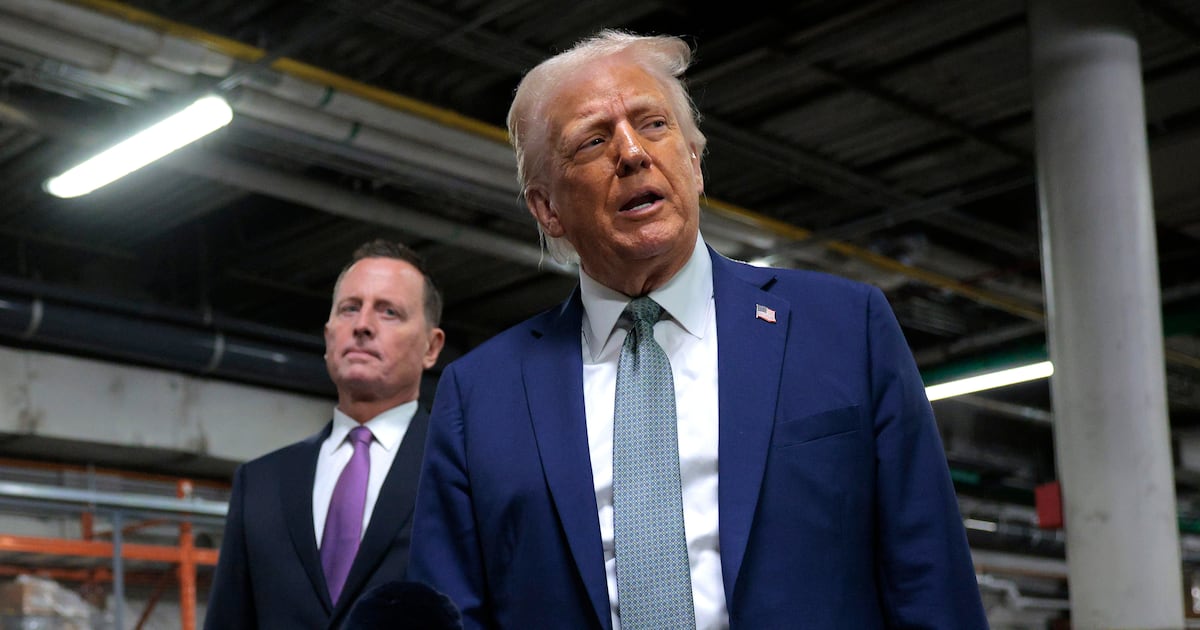Kentucky Senator Rand Paul is the Republican party’s most visible dove and skeptic of foreign intervention. So it raised more than a few eyebrows when he added to his nascent presidential campaign a long-time foreign policy hand who has spent years intervening in other countries’ affairs and is associated with the Senate’s best-known hawk.

Lorne Craner, a former John McCain staffer, Bush administration official, and democracy promotion advocate, recently joined the ranks of the Kentucky Republican’s potential 2016 campaign. The move, first reported last month in The Washington Post, has left some in the GOP foreign policy world perplexed.
No Republican presidential candidate in recent memory has won the nomination on a dovish or non-interventionist platform. But eight years of war under the Bush administration left Americans war-weary, and may conceivably open up space for a Republican candidate arguing for a foreign policy of restraint. Indeed, a potential Hillary Clinton v. Rand Paul race could see many neoconservatives back the Democratic candidate. Is a former McCain staffer’s defection to the Paul camp a sign that the hawkish Republican foreign policy establishment is co-opting the non-interventionist – some would say isolationist – Rand? Or is Rand co-opting them by merely using his newfound adviser as a fig leaf?
“Very odd,” is how one board member of the International Republican Institute, which Craner headed until last year, describes the move. IRI is the Republican offshoot of the National Endowment for Democracy, founded by Congress over 30 years ago to promote democracy and good governance overseas. It has long been a target of ire for the isolationist wing of the GOP – like Rand Paul’s father, former congressman and perennial presidential candidate, Ron -- which sees it as a meddlesome, money-wasting plaything of the party’s foreign policy hawks. McCain has been IRI’s chairman for over 20 years.
“Lorne’s whole career at IRI and at State was about having a vigorous human rights policy and about American foreign policy activism,” a former senior foreign policy official in the Bush administration told The Daily Beast. “So how does he end up with the leader of American isolationism?”
To hear Craner, whose position with Paul is “informal and unpaid,” explain it, the Senator has been unfairly tagged with the isolationist label, and his reaching out to internationalist Republicans like himself is a sign of open-mindedness. “I think he’s an important new voice in the foreign policy debate and I think he’s an important voice in the debate within the party on foreign policy,” Craner, served as Assistant Secretary of State for Democracy, Human Rights and Labor, told The Beast. “He’s not an isolationist. He accurately describes himself as a non-interventionist; he has a very high standard for when we should intervene in a country.”
A crucial area where one might expect Craner and Paul to disagree is foreign aid. Craner, after all, has spent his career promoting a robust American presence overseas; IRI receives and dispenses grants from the federal government for a host of activities ranging from political party building to election monitoring. Paul, meanwhile, has called for the gradual elimination of all foreign aid, starting with countries where burn the American flag. Asked how he squared his work on overseas democracy assistance with Paul’s worldview, Craner replied that “there is waste in foreign aid” that “U.S. strategic interests can be advanced, and the lives of people in other countries improved, by judicious use of foreign aid” and that “there's more to foreign policy than foreign aid.”
Craner’s move to work with Paul is also striking considering the relationship that exists between his old mentor, McCain, and the Kentucky Senator. McCain is no fan, to say the least, of the Paul clan. Representing the dovish and hawkish wings of the GOP, respectively, the elder Paul and McCain clashed frequently during the 2008 Republican presidential primary. So testy was their relationship that Paul ultimately endorsed three fringe candidates over McCain, the eventual Republican nominee. Last year, when Rand spent 13 hours filibustering the nomination of CIA Director John Brennan over the Obama administration’s drone policy, McCain included him in a group of obstructionist legislators he derided as “wacko birds.” Asked whom he would support in a hypothetical Hillary Clinton v. Rand Paul presidential match-up, McCain replied, “It’s going to be a tough choice.”
And while McCain has been the most forceful advocate for American intervention in Syria, Paul couldn’t be more skeptical of such a move. Last August, Paul speculated that a chemical weapons attack in Syria may have in fact been the work of the Syrian opposition, and not the government of Bashar al-Assad, as Washington and its allies alleged. Paul, an outspoken opponent of American intervention in Syria, raised the possibility that the rebels had perpetrated an attack on their own people in order to drag Washington into the conflict. “All of this redounds back to this is to the benefit of the rebels because now it’s bringing other people in on their side.”
But in an interview with The Daily Beast, McCain wished the best for his former staffer, whose father spent time with McCain as a prisoner in the Hanoi Hilton, while also taking something of a backhanded swipe at Paul. “I’m glad that he’s there. It’s obvious that Lorne has a long record of involvement and advocacy for human rights and I think he will have a beneficial influence on Senator Paul on that issue.” In McCain’s telling, Craner will moderate Paul, moving him away from some of his more populist, yet unwise, foreign policy positions, and thus help close the gap that has been growing between the Republican party’s interventionist and isolationist wings.
Craner got to know Paul back in 2012, when the Egyptian government arrested several IRI employees – including, most prominently, Sam LaHood, son of former transportation secretary Ray LaHood – as part of a broader assault on foreign-funded non-governmental organizations. Paul, eager to tap into an angry current pulsing through the American body politic and find an example of foreign aid gone awry, forced a floor vote in the Senate that would have cut off the $1.3 billion aid package that the US annually gives to Egypt unless it released the workers. Though Paul’s proposal didn’t go anywhere, his position allowed him to play bad cop to the administration’s good cop vis a vis the Egyptian government. “I think that in retrospect, that provided impetus for some people to move more quickly than they might otherwise have done in the administration,” Craner said.
Paul again attempted to cut off aid to Egypt the following year, and like his more recent effort to strip U.S. aid to the Palestinian Authority unless it explicitly recognizes Israel’s right to exist as a Jewish state, establishment Republicans distanced themselves from what they portrayed as a short-sighted, populist-friendly proposal. “Terrible public policy,” is how Senator Bob Corker, the ranking Republican on the Foreign Relations committee, termed Paul’s Egypt aid bill.
It’s all part of a larger effort by Paul to maintain Ron’s fiercely loyal and active libertarian support base while simultaneously appealing to a broader section of the public and GOP elites. Associating himself with establishment Republicans like Craner and Richard Burt, a former Reagan Defense Department official also named in the Post piece as an advisor to Paul on foreign affairs, is one way of doing this. Working on behalf of the imprisoned IRI workers was another, and it also provided an opportunity for Rand to distinguish himself from his father in an important realm of foreign policy: democracy promotion.
In his 2012 book, Government Bullies, (for which Ron wrote the forward), Rand praised IRI and its Democratic counterpart, the National Democratic Institute. “These organizations are not partisan,” he wrote. “They do not choose political sides. They do not provoke or become involved in the politics of any country they work in. They do not encourage or cause dissent. They do not advocate against government.”
This stands in stark contrast to the writings and speeches of his father. As far back as 2004, when Ukrainians first overthrew autocratic President Viktor Yanukovych, Paul was attacking NED and its subsidiaries for their role in Ukraine. In March, he wrote that NED “should be disbanded immediately.” The website of the Ron Paul Institute for Peace and Prosperity, an eponymous think tank the former congressman established last year, features several articles attacking NED, accusing it of organizing a “coup” against the former government in Ukraine.
Since entering the Senate four years ago, Paul has delivered mixed signals on foreign policy. In a January speech delivered to the realist Center for the National Interest and presided over by his soon-to-be-advisor Burt, Paul warned about the “worldwide menace of radical jihad.” Those are words that would’ve never emerged from the lips of his father, who paints all talk of Islamism as fear-mongering and has openly sided with Russia in the crisis over Ukraine. Senator Paul also scorned “labels” and the tendency to corral politicians and thinkers into neat, ideological camps. Yet, moments after criticizing such epithets, he launched into an attack on “neoconservatives,” scoffing that, “To this crowd, everyone who doesn’t agree with them is the next Chamberlain.” Burt told me that he considers Paul a traditional, Republican realist. “One of the problems with McCain’s worldview, if I can put it that way, is that if the only tool in your tool kit is the hammer of military power, every problem, every international problem looks like a nail.”
But Paul’s recruiting of establishment GOP foreign policy hands to his campaign may also be a design to cover what is, in reality, a confused and indeterminate worldview, if not one that is much closer to the conspiratorial outlook enunciated by his father. A revealing incident occurred in 2009, before Paul announced his candidacy for Senate. In a speech at Western Kentucky University, Paul alleged that former Republican Vice President Dick Cheney supported the Iraq War to turn a profit for Halliburton, the conglomerate Cheney headed in the mid-1990’s. “Dick Cheney then goes to work for Halliburton. Makes hundreds of millions of dollars, their CEO. Next thing you know, he's back in government and it's a good idea to go into Iraq,” Paul said. It’s a point of view more associated with conspiratorial web sites than the mainstream of the Republican party.
Nowhere has Paul’s foreign policy incoherence been more pronounced than on Ukraine, where he has alternately sounded solicitous and threatening to the Russians. Just a few weeks prior to Russia’s annexation of the Crimean peninsula, he chided Republican hawks, saying that Washington needs to be “respectful” of Moscow and that, “Some on our side are so stuck in the Cold War era that they want to tweak Russia all the time and I don't think that is a good idea.”
Days before a Moscow-orchestrated, illegal plebiscite resulted in a 97% support for Russian annexation, Paul did more than “tweak” Russia, however. “I would reinstitute the missile-defense shields President Obama abandoned in 2009 in Poland and the Czech Republic,” he wrote in TIME. (This was the exact opposite position he took prior to announcing his Senatorial run in 2009, when he condemned the Bush administration for having done precisely that, saying, “We have to decide whether putting missiles in Poland is gonna provoke the Russians.”)
“Let me be clear: If I were President, I wouldn’t let Vladimir Putin get away with it,” Paul sternly warned in his TIME commentary. Yet the very next day in a piece for Breitbart.com, he complained that, “some politicians have used this time to beat their chest. What we don’t need right now is politicians who have never seen war talking tough for the sake of their political careers,” a comment seemingly directed at McCain, which was doubly strange as considering his well-known war record.
What sort of foreign policy a president Rand Paul would elucidate remains to be seen, but one thing is for certain: his interjection into the race will spark a heated debate over America’s role in the world. That’s one which Craner, among other Republican foreign policy hands, is eager to see. His new advisee, Cramer said, is “very interested in talking to people he might not necessarily agree with and very curious about issues, none of which are common commodities in DC these days.”

